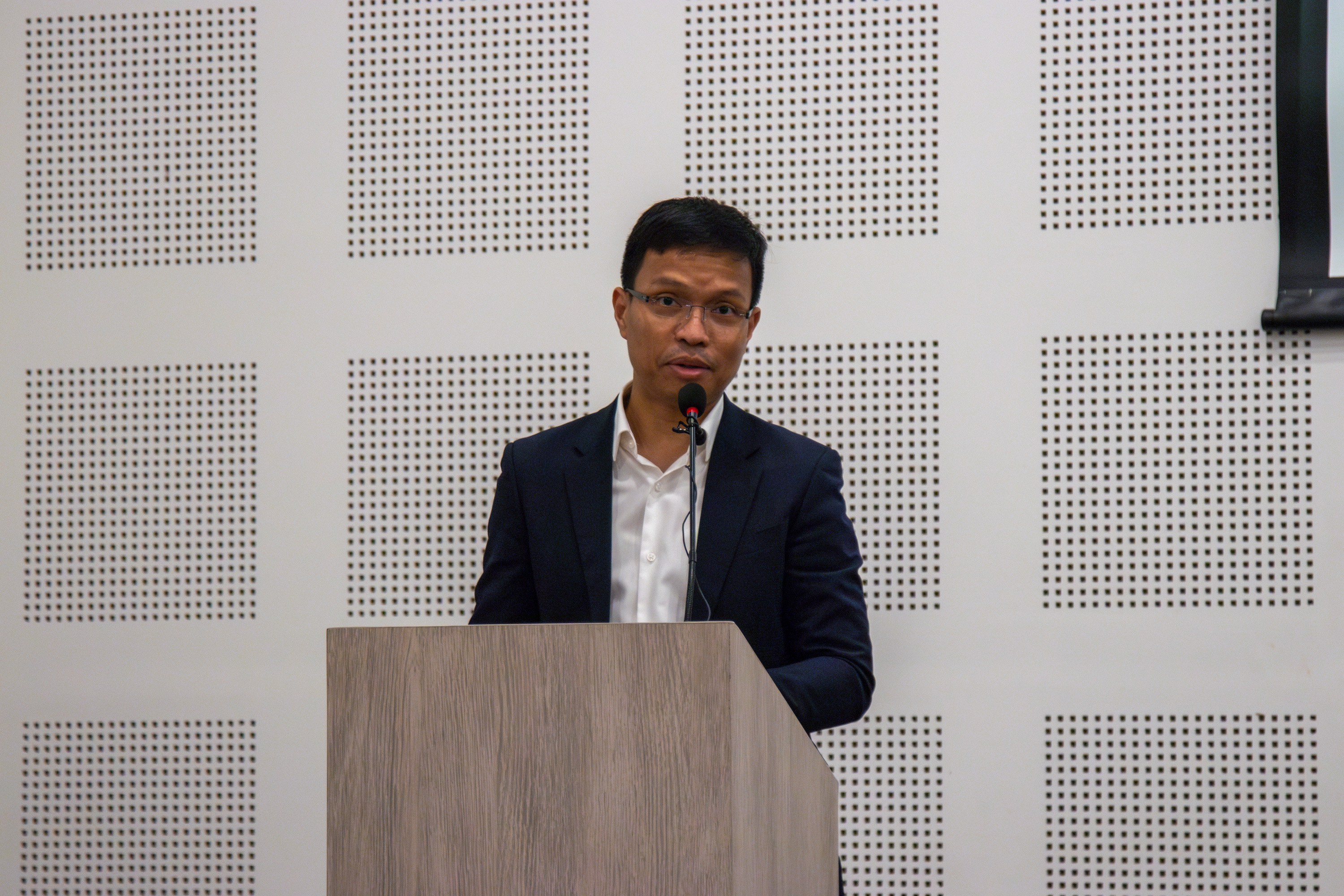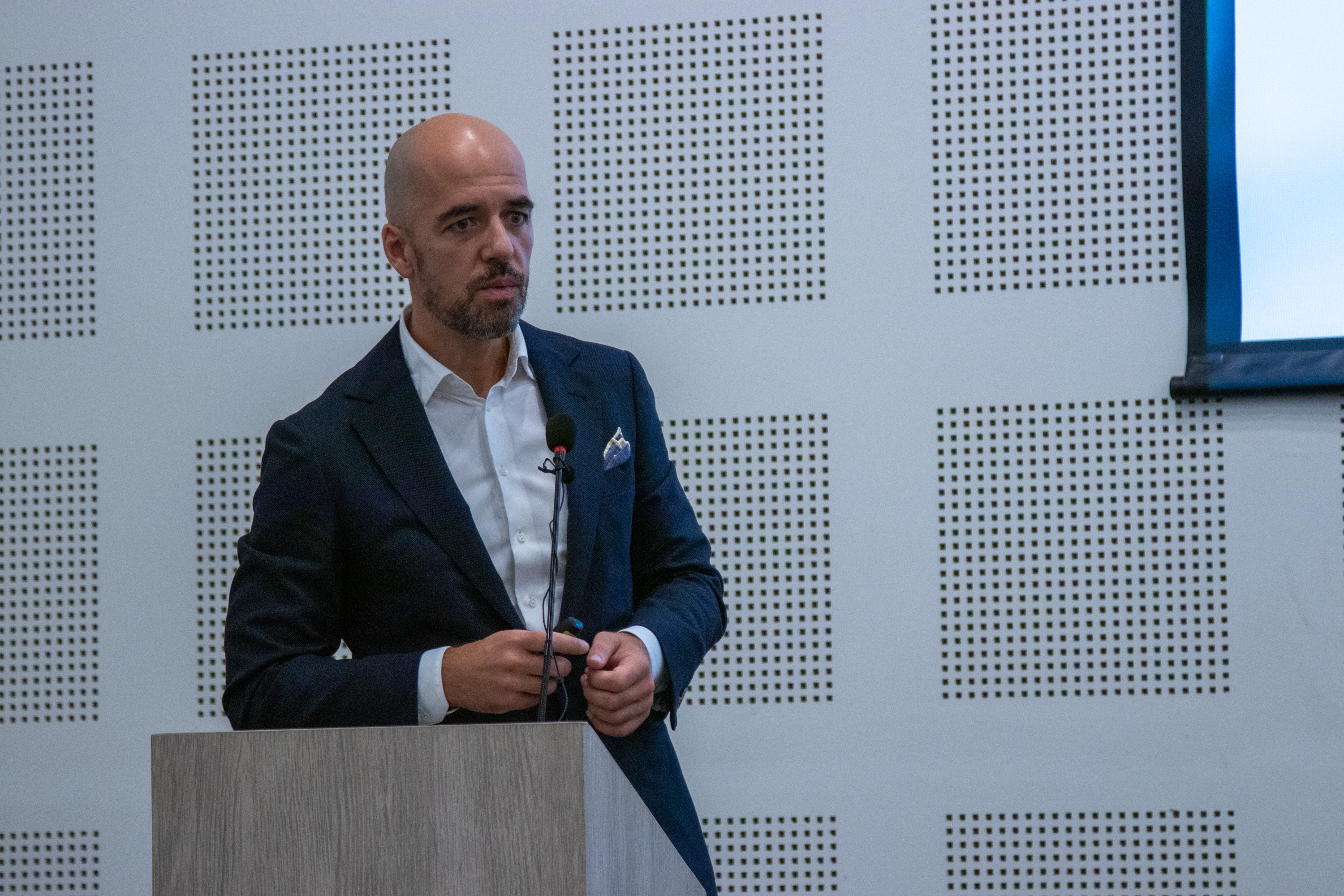
At the start of August 2024, EuroCham's Digital and Technology Committee hosted a 'Digital Assets 101: Crypto and Blockchain in Cambodia' breakfast talk at the BRED Bank Auditorium in Phnom Penh. The event featured discussions on the opportunities and challenges of crypto and blockchain for Cambodia and its current regulatory landscape.
The breakfast talk was joined by Thomas Schings, General Manager at Royal Group Exchange (RGX), Ouk Sarat, Deputy Director General of Central Banking Operation and Director of Payment System Department, National Bank of Cambodia (NBC) and guest speakers from Poland, Lukasz Braciszewski co-founder of Tokenomia.pro (a blockchain architect company) and Janusz Zieliński (co-founder of Ari10).
During the panel discussion other experts who participated included:
- Mike Gaertner, COO/CTO, Sabay Tech
- Adrienne Ravez-Men, Senior Consultant/ Advisor in Digital Innovation and Strategic Communication at Global Innovation and Change (GIC)
- Kenneth Tang, Vice Chairman at Eurocham’s Digital & Technology Committee
- Tomas Pokorny, CEO of Pi Pay
Cambodia Crypto and Blockchain Market 2024
According to Schings, Cambodia has a high adoption rate of blockchain technology despite lacking a full legal framework. Based on several surveys, he said about 10.6 per cent of Cambodians are using digital assets, and 65 per cent are currently using the homegrown blockchain-based payment system 'Bakong'.
Regarding Cambodians who have digital assets, Schings said they are primarily using Binance, with around 200,000 accounts. "It's quite a high number compared to the global average of 6.8 per cent, so it is interesting," he noted.
The RGX General Manager stated that Cambodia currently utilises blockchain technology for various applications, including e-KYC (Know Your Customer), loyalty programs, and charity initiatives such as CAMDL, Selendra, and Poor Doge. Notably, blockchain is used in the loyalty programs offered by both Zando and Brown Coffee.
Schings explained that Cambodia does still need a full legal framework, and is currently behind Singapore and neighbouring countries like Vietnam and Thailand in terms of digital assets exchanges. Until 2022, Thailand and Vietnam had eclipsed Singapore as the biggest crypto trading hubs in ASEAN with over USD $100 billion digital asset bought buying and sold, despite being in a nascent stage of regulation.
The Role of RGX In Cambodia’s Crypto Market
Schings explained RGX's mission is to be the primary digital asset exchange in Cambodia, bridging traditional finance and the new world of digital assets. RGX's platform features include spot trading, futures trading, and P2P (Peer to Peer) trading, with a focus on security and risk management.
Cambodian Regulations On Crypto: National Bank Vs. The Securities Exchange Regulator
During the panel, Schings said the Cambodia National Bank (NBC) has stricter rules on crypto transactions, such as only allowing the use of stablecoins (such as USDT). Meanwhile, the securities exchange regulator (SERC) is allowing people to trade all kinds of securities, as long as they are KYC (Know Your Customer) compliant.
"There's a different opinion between the NBC and SERC, a lot of things are said with just opinions for now, and nothing has been set in stone yet," he emphasised.
Under the SERC, he said the approach is very different as long as the products (coins or tokens) are approved and not scams. RGX is a company that is legally registered by the SERC, operating under the FinTech Regulatory Sandbox.
Schings commented, "I think the synergies might depend on how the NBC will implement what they are planning to do in the National Roadmap for Digitalisation. The roadmap states that digital assets should be regulated by SERC. It's a very clear national roadmap, which is signed by the Prime Minister, so it takes precedence over both the Ministry of Economy and Finance (MEF) and the NBC.
However, cooperation between the NBC and SERC will facilitate a more convenient and user-friendly regulatory environment.
Preventing Criminal Activity On RGX Platform
Schings emphasised that in order to prevent money laundering and other criminal activities, RGX uses Know Your Customer chain analysis, and the regulatory sandbox to ensure compliance with anti-money laundering laws (AML) and prevent criminal activities.
He emphasised
We won’t allow the criminals to use our platform, [...] Our mission is to bridge the gap between traditional finance and the new world of digital assets, to allow everybody to be part of the digital asset revolution, and also to help financial inclusion, financial diversity and financial freedom in the end.
What Is Cambodia's National Bank Stance On Cryptocurrency Regulation?
Ouk Sarat stated that in the past, the National Bank of Cambodia's engagement with crypto was issuing regulatory guidelines restricting financial institutions from engaging in crypto activities.

In 2018, the NBC issued a notice to banking and financial institutions, prohibiting regulated financial institutions under the central bank from dealing directly or indirectly with crypto activities, such as buying, trading, acting as a custodian, or publicly promoting crypto assets. This restriction is still in effect as of 2024.
Sarat said, “Given that we don't really know most of the aspects of crypto, that's why we do not really advise the public to engage in these crypto activities, so now we're still in the process of learning it.”
In April 2024, the NBC clarified that there is a future possibility of banks in Cambodia dealing with stablecoins like Tether (USDT), USD Coin (USDC), and other potentially land-backed tokens. They do not plan on letting banks or payment firms deal with popular cryptocurrencies such as Bitcoin, Solana, or Dogecoin.
The NBC is considering allowing Payment Service Providers (PSIs) to deal with crypto assets in Group 1a (tokenised traditional assets) and Group 1b (stablecoins), while they are prohibited from dealing with crypto assets in Group 2 (unbacked crypto assets).
Crypto Asset Classification In Cambodia
The Cambodian regulatory framework ‘Cambodia Draft Regulation on Crypto Assets’ categorised crypto assets into two main groups:
Below is an excerpt from NBC Ouk Sarat’s slide presentation (this current draft is still being reviewed)
Group 1: Consists of crypto assets that are the digital representation of traditional financial instruments or the value of which refers to traditional assets or to a pool of traditional assets known as reference assets.
- Group 1A: Crypto assets that are tokenised traditional financial instruments, on which banks are allowed to carry out transactions according to Articles 2 to 4 of the Law on Banking and Financial Institutions. This includes tokenised securities.
Group 1A crypto assets are digital representations of traditional financial instruments, using cryptography, DLT, or similar technology to record ownership. They pose the same level of risk and confer the same rights as the traditional underlying instruments.
- Group 1B: Crypto assets that are stablecoins with an effective stabilisation mechanism to traditional assets or a pool of traditional assets. Stablecoins stabilised to other crypto assets (including Group 1A crypto assets) or algorithm-based stablecoins do not qualify as stablecoins in this group.
Group 2: Crypto assets that do not meet the criteria of Group 1 crypto assets, including but not limited to unbacked crypto assets.
Watch a snippet of Ouk Sarat's presentation on the NBC's draft regulation on crypto assets:
Blockchain To Enhance Cambodia's Agricultural Supply Chain And Logistics, Boosting International Trade
Speaking with B2B Cambodia, Lukasz Braciszewski, co-founder of Tokenomia Pro, a blockchain architect company from Poland, said that blockchain can support increasing transparency in the supply chain system, which can facilitate international trade.
He emphasised:
Blockchain can support supply chains in a transparent way to store all the information from the beginning to the end of the supply chain process - this is the most important aspect, as each agent in the process and each step can communicate in a secure, easy, and transparent way to see all the certifications and documents, and track back.
He added that this can be helpful when some products need to be traced back to the creation or initial stage, which can be done via blockchain technology. "So it's easy, thanks to the technology, we can support and enhance the entire supply chain and the next step in global trade," he said.
Adding to that, Kenneth Tang said blockchain offers a really big opportunity, given Cambodia's supply chain issues.
"I think everyone probably knows about the RCEP (Regional Comprehensive Economic Partnership). I think if we can improve our supply chain, there are immediate opportunities to that," he said.
He added:
In terms of business, there are definitely advantages, particularly in cross-border trade, when you need to have something immutable. For example, when you make a payment, it's all on the blockchain. And I think this is particularly important when we try to promote trade in Cambodia.
Crypto And Blockchains Aren't A Scam
Tang added that people often think of crypto as something dangerous, however, he said the world is moving faster than the actual regulation.
Braciszewski is currently in Cambodia and is in touch with the Cambodian government to create a 'Digital Asset Cambodia Hub' to speed up the adoption of this evolving technology to enhance business and to educate businesses on incorporating blockchain technology into their operations in Cambodia.

He emphasised that promoting digital asset education on this technology is very important.
"A lot of people still think that blockchain is equal to crypto [and] equals scam. So this is the way that we should educate, and that's also why we are here, to educate more businesses, people, the private sector, [and] government, just to understand that this is really a technology that should be enhanced," he said.
He added that thanks to this technology, we can create and build things, and we shouldn't make the blanket assumption that crypto is a scam because this is a technology that can be used in various positive ways.